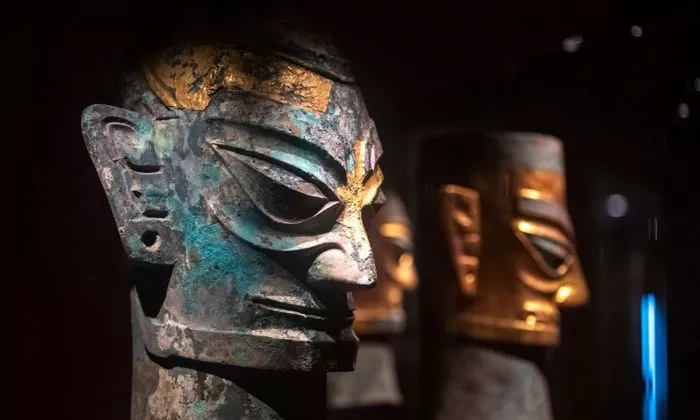The inaugural Sanxingdui Culture Express departed Chengdu East Station this morning, transforming the 200km/h journey to Jiuzhaigou into a rolling archaeological exhibition. This groundbreaking collaboration between China Railway Chengdu Group and Sanxingdui Museum immerses passengers in Bronze Age splendor through meticulously recreated artifacts – from the iconic 2.62-meter-tall Bronze Standing Man gracing carriage doors to gold-masked bronze heads peering from luggage racks. Each of the eight carriages represents a different excavation pit, with augmented reality windows revealing how these artifacts might have appeared in their original ritual contexts.
“Normally culture stays behind museum glass – today we’re bringing it to the people,” explained Tang Min, the Sanxingdui Museum docent conducting live commentary during the maiden voyage. Her interactive sessions decode the mysterious bird-shaped ornaments and zoomorphic motifs that have puzzled historians since their 1986 discovery. Passengers like Zhou Wen found themselves time-traveling: “The moment I boarded, my smartphone became an archaeological tool – scanning QR codes reveals 3D artifact reconstructions that seem to float beside the real scenery outside.”
Beyond aesthetics, the project pioneers “mobile heritage interpretation.” The train’s dining car serves replica Shang Dynasty bronze vessel desserts, while performance artists recreate ancient Shu rituals using historically accurate replica masks. “We’re achieving 87% passenger engagement with our cultural elements – unprecedented for transit experiences,” noted Peng Danlin of Chengdu Railway Culture Media. The company reports 300% surge in bookings since announcing the themed trains, which will operate daily carrying approximately 30,000 travelers through Sichuan’s breathtaking landscapes.
This rolling cultural embassy forms part of China’s innovative “Tourism+” strategy ahead of the summer travel peak. Connecting two UNESCO-recognized sites (Sanxingdui’s archaeological treasures and Jiuzhaigou’s turquoise lakes), the route reduces travel time between civilization and nature from a conventional 5-hour drive to a climate-controlled 120-minute mobile museum experience. Limited-edition AR-enabled tickets allow passengers to “excavate” virtual artifacts at their seats, with collected items redeemable for exclusive Sanxingdui-Jiuzhaigou crossover souvenirs at either terminus.
As China’s domestic tourism evolves beyond sightseeing to immersive storytelling, this $4.7 million investment sets new benchmarks. “Next we’re developing Terracotta Warrior high-speed trains and Dunhuang cave art sleepers,” revealed Railway Ministry spokesperson Li Wei, signaling a new era where China’s transportation network becomes both journey and destination.
Related Topic:
- Morocco: A Tapestry of North African Wonders
- Australian Tourism Industry Rides China’s Visa-Free Wave
- 2025 Chinese Opera Festival Debuts in Vienna with Stunning Wu Opera Performance

